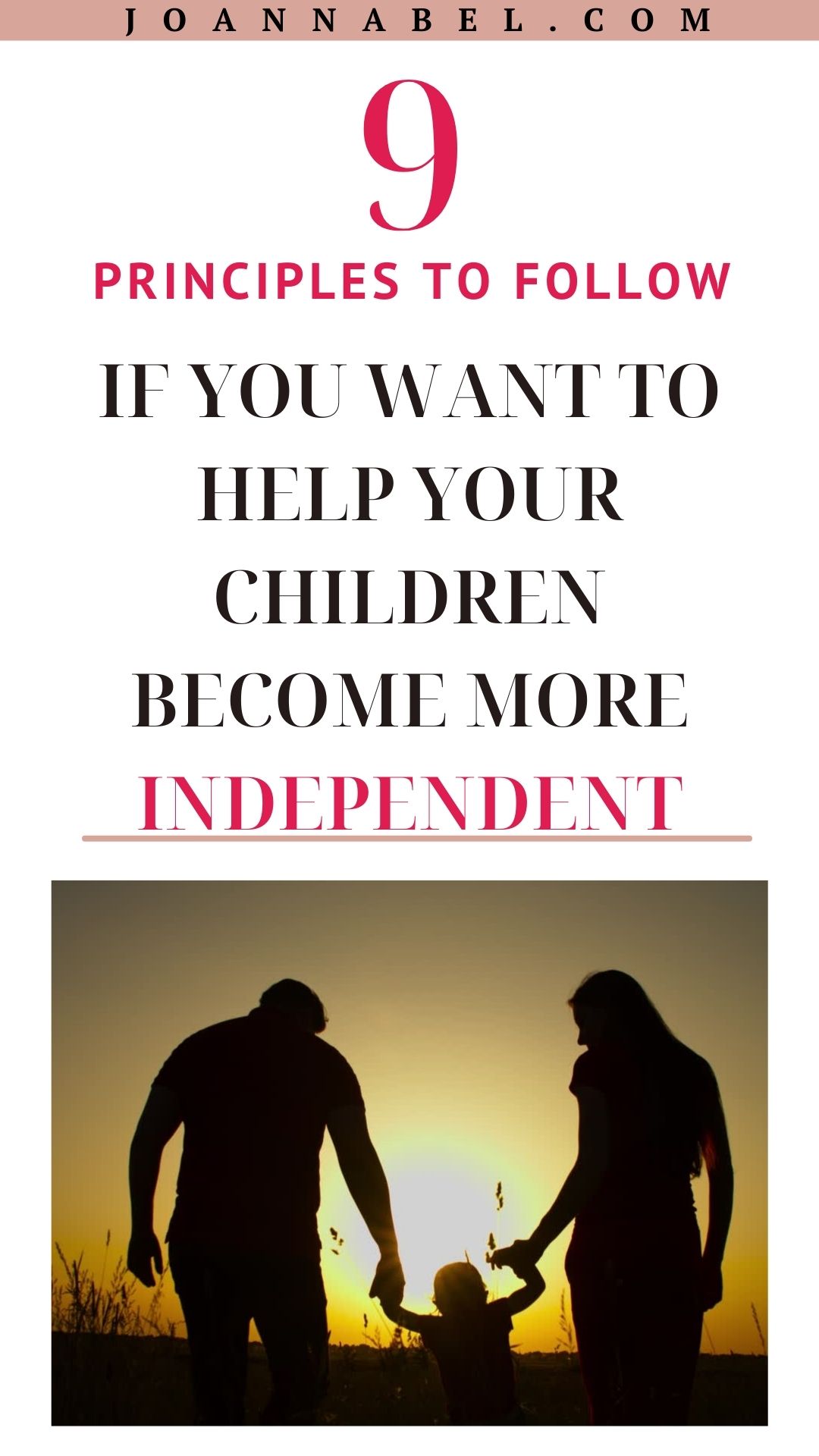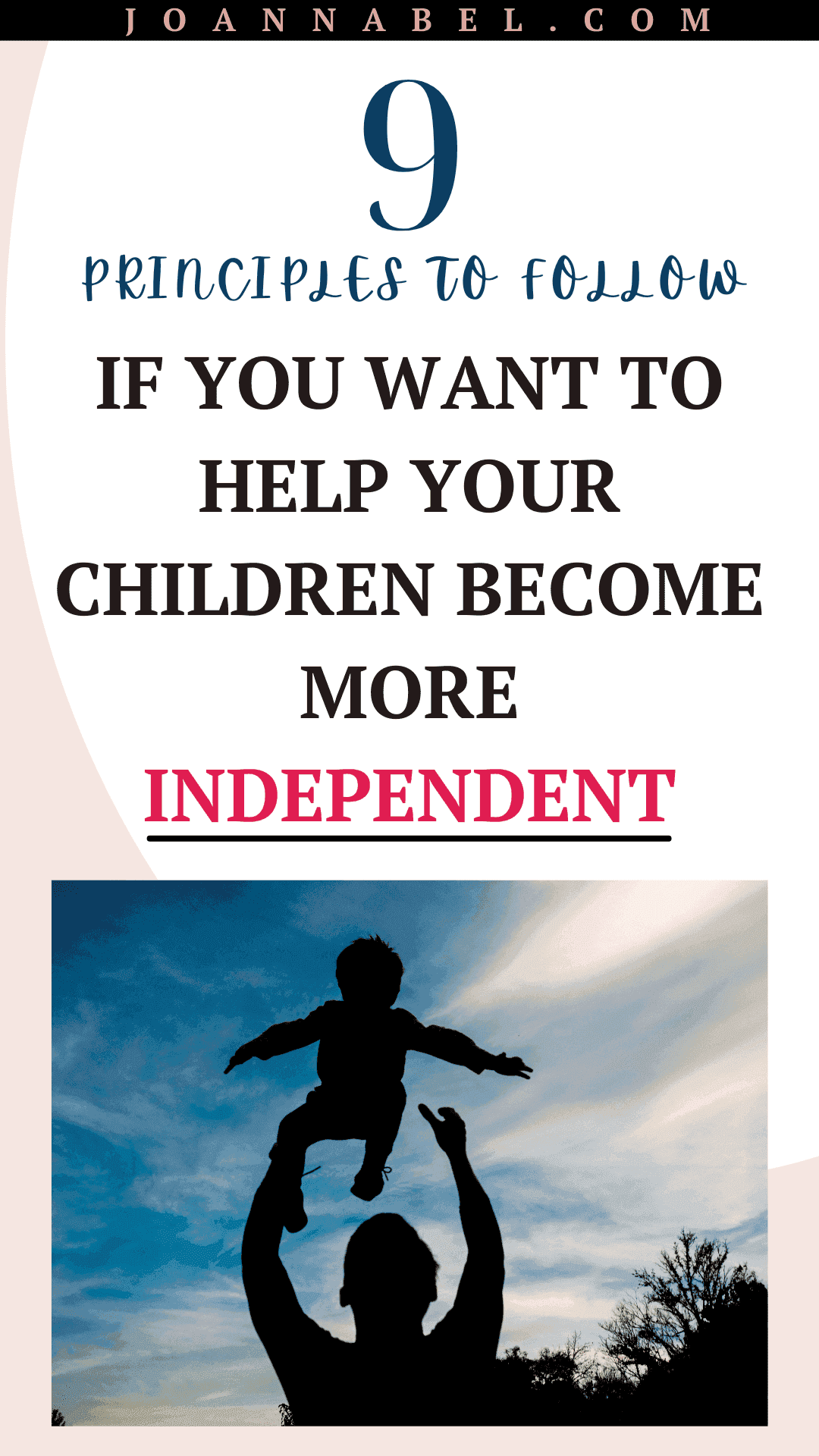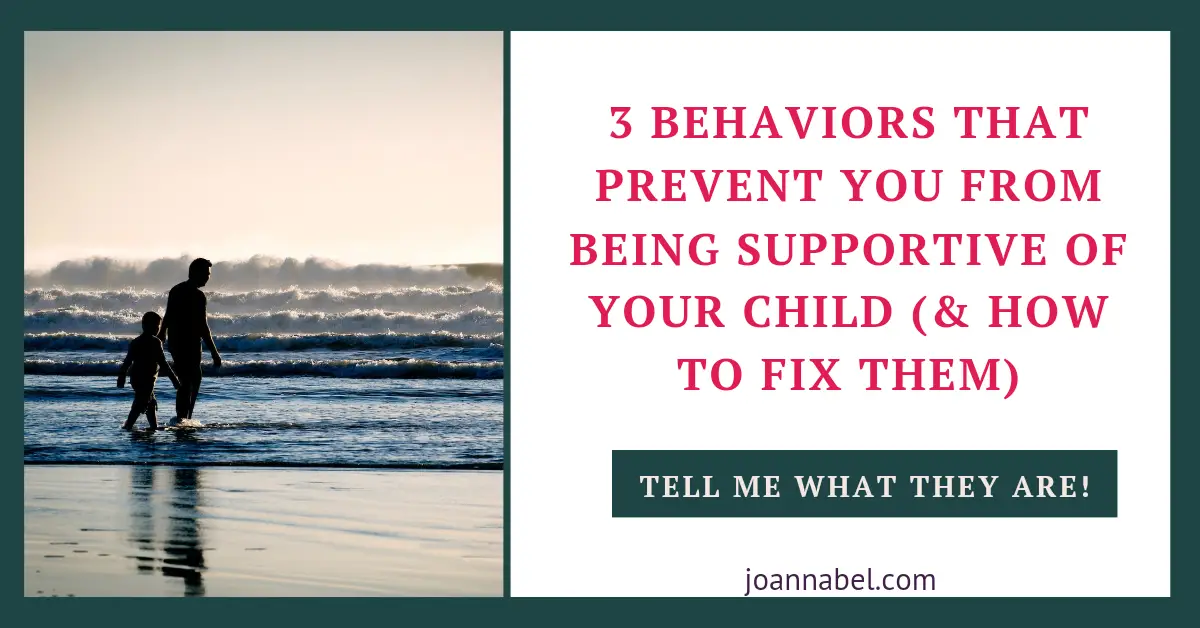If you’re asking How do I help my child become more independent? Or How to raise an independent child– the shortest answer is to let and encourage them to practice independence from the earliest age if you want to support them to become more independent.

How To Raise An Independent Child
More precisely, to help your child become more independent, you need to integrate certain principles that promote the child’s independence in your parenting practices and family life’s everyday activities.
This is true for children who face developmental challenges, as well.
So in this post, we’ll cover those principles that will help your child become more independent. The principles are not numbered by order of importance.
Let’s start!
Note: Although I am a Clinical Social Worker, engaging with this website does not establish a professional social worker-client relationship. The information provided here is for general purposes only and should not be considered professional advice. While we strive to ensure accuracy and reliability, this content is not a substitute for professional guidance. For specific concerns, issues, or situations, it is essential to consult a qualified professional and present your situation. Read the full Disclaimer here.
WHY IS IT IMPORTANT FOR A CHILD TO BE INDEPENDENT?
It is important for a child to be independent, first of all, because a child needs to experience a fine balance between dependence and independence in accordance with their age and level of maturity.
This way you’re being responsive to their needs.
Naturally, as they grow they should be more and more independent.
But the principle is that you continue to motivate and encourage independence. And to not do things on their behalf just because it’s faster or it seems easier at that moment. If they can do it, they should do it.
If they’re not that skilled yet, the key is that you support them to become more and more skilled. Not to demotivate their efforts if they’re not perfect.
Always prioritize functionality over perfection and always take efforts into account, don’t just measure results.
This can be detrimental.
Secondly, by practicing independence they will grow into authentic, autonomous people who are confident in their abilities, competent to make independent choices, live authentic lives, and face life’s challenges and overcome them by relying on their strengths and capabilities.
I’d like to mention several reasons why it’s essential that you go the route of encouraging independence.
Let’s see:
- Promoting independence builds confidence in kids
- Encouraging independence in a child builds tolerance for frustration
- Becoming more and more independent gives children a voice
- By exercising independence, children gain life skills
- As children grow to be more independent this strengthens their responsibility
- Encouraging independence toughens kids to deal with feeling like an imposter
- By supporting children’s independence, you’re supporting building skills of decision-making
- Empowering kids in becoming more independent builds children’s resilience
- Promoting independence motivates children to overcome fears
- Children have an intrinsic desire to become more independent.
If you want to look into this in more detail, I have a blog post that covers all 10 reasons why it’s important for a child to become more independent.
Here is the link to it: 10 Reasons Why It Is Important For A Child To Be Independent.
Now, you’re asking…
HOW TO RAISE AN INDEPENDENT CHILD?
You will raise an independent child by letting them practice independence from the youngest age. Being independent can go hand in hand with protection and being safe.
What it takes is that you ensure their independence and evolving autonomy are practiced securely every day of/regularly in their lives.
It takes a bit of practice at the beginning. But with more practice, just as with anything else, you’ll create a habit to encourage their independence, instead of suppressing it.
Because not encouraging independence is suppressing it.
If you want your child to grow into independent adult you must create conditions for a child to practice independence throughout their childhood, from the youngest age.
It’s not possible for children to become independent adults if they are only allowed independence once they turn 18. This is something that needs regular practice.
Among other things, a lack of opportunity for children to exercise autonomy can even make them feel like imposters in their lives. Considering:
- they won’t feel confident to make autonomous decisions,
- lack of participation will exclude them from engagement in their communities, and
- they will be too codependent and insecure to show true authenticity.
Now let’s talk about how you can avoid all of that.
I’ve created a list of principles I mentioned previously. And you should include and implement them in your everyday activities and decisions that include children or affect them.
Let’s begin.

#1 CHILDREN NEED TO DO THINGS BY THEMSELVES
It’s amazing that you want to protect your children and keep them safe. But it’s critical that you find a balance with protection considering control gets disguised in protection.
Too much protection sends a message that you see children as less competent than they are.
And that you don’t see them as competent individuals who can learn to do things by themselves.
Even though you could save them (or save you) time and effort sometimes, you must let them do things by themselves.
Firstly because with more experience they become better and better in any activity they take on.
Secondly, it’s freeing and empowering when they find their ways to do things in life.
Thirdly, trying out things and doing them their way gives them the opportunity to make mistakes they can learn from.
Lastly, doing things by themselves builds up confidence in their skills because they get a chance to get better and better.
Many children and young adults avoid certain activities because they feel uncertain about their skills to do them.
This applies to social skills. And even prosocial behavior, too. This tells us that some would rather put themselves in danger just so they don’t feel insecure and look uncoordinated!

This is why it’s critical that they gain more and more experience, so they can feel confident that they have mastered the skill, without the pressure of being perfect or the best or they shouldn’t bother even trying.
To encourage them praise their efforts and offer your help but don’t be intrusive.
Monitor and guide them but don’t take away their chance to build their skills.
I know you’re busy and have so much on your plate.
But always try to prioritize building children’s independence, because this will be your greatest legacy to them.
If you raise them to become competent to live an independent life, that’s the ultimate parenting success you’ve achieved.
You may want to read also:
#2 CHILDREN NEED TO MAKE CHOICES
Let them make choices from the get-go. This doesn’t mean doing it without monitoring, limitations, or boundaries.
It means providing conditions for them to participate in decision-making in their lives, which gives them more control over events in their lives, and through this, influence the course of their life.
This is important for any human. No matter if you are their doctor, their lawyer, parent, teacher, etc.
All these people need to respect the humans’ (including kids’) inherent need to participate in decision-making.
Kids need to learn to make choices and exercise autonomy. And this is not possible if they don’t learn how choices are made.
The reason why majority of (young) people are feeling like imposters when it comes to, for example, social and political change is that they didn’t have a regular chance to be asked and listened to while they were growing up.
And most of us, if not all, were treated this way. And now when we’re adults we’re expected to be skilled at independent actions and autonomous.
How can we be skilled at something that demands we have previous experience with it?
It puts us at unease and like we can’t live up to the task.
Making choices can also teach children that they need to make mistakes so they can make progress in their lives. And that life has to move on.
But also, that life won’t stop if they decline to make a choice, because this is a choice, too.
And finally, they get a chance to learn that they can’t wait for everyone to like or support their decision.
These exact things I just pointed out here are challenging for many people who are struggling with independence as adults.
I’m sure you’ve experienced this can be difficult for these people. But also for you, if you’re in any type of a relationship with them.
That’s why I encourage you to support your kids in becoming people who are the exact opposite because they’re becoming more and more skilled at independent decision-making as they grow and mature.
You should always keep in mind that children have the right to express their views about things that affect their lives indirectly or directly in a way that’s comfortable for them and adapted to their age and maturity.
If they want to do this, naturally.
Paternalistic protectionism is referred to denying someone the right to make their own decisions with an explanation (or better said excuse) that you’re protecting them. This way people, including children, are denied power and control over their lives.
The fact that parents (or other adults in their environment) are responsible for protecting children from harm doesn’t mean that they are to make the decisions on their behalf without them being included in the process.
Moreover, they are responsible to include children in decision-making in a way that’s suitable for the child’s age, and maturity and according to their evolving autonomy and evolving capacities to make independent choices.
This means that children aren’t ever denied (restricted in) any rights that adults have.
What it means is that the burden of decisions (responsibility) needs to be shared with children. (In accordance with the child’s age, maturity level, and evolving autonomy as I mentioned many times already.)
So as adults, we have an obligation to help children exercise their right to participate in decision-making about everything that affects them.
And not make them passive recipients and spectators in our constructions of their reality.
#3 CHILDREN NEED TO GIVE CONSENT
This principle is closely related to the previous one and what it means is that they get a saying about things that affect them, by creating circumstances where they can give consent and making sure they’re treated in a way that you never take power away from them.
Always think like this – is this the thing that affects my child? And include them in the conversation.
It’s important that they learn from the very beginning that their consent is always needed. So that they can learn to properly protect their personal boundaries, claim their power, sustain control, and preserve their autonomy.
Let’s talk for a bit about the integrity of the body.
You shouldn’t let other people (including you) force any physical interaction on them.
And you should support them when they’re opposing other people touching, hugging, or kissing them without their consent. No matter who those people are.
Kids’ emotions and convenience are much more important here than the emotions of those people who may find themselves offended by this prohibition.
This way you’re supporting children’s need for control and their bodily integrity and autonomy.

Kids are no different than you when it comes to consenting to physical touch. The problem is we traditionally don’t see and treat children as equals.
And many times due to children’s position of dependence on care, we deny them the right to (be included in) decision-making about their lives, with excuses that they can’t make rational choices because they need care.
This is a false assumption and argument. You must reverse the process – children are competent to participate in decision-making and make rational choices unless it’s proven different.
Violation of children’s rights and abuse are direct consequences of not treating and positioning children as equals and trying to impose criteria on kids that don’t fit the children’s needs and position.
This then implies that children have owners and that they’re not autonomous and sovereign.
What you should do and tell others that get in contact with your children like family and friends, when it comes to the integrity of the body, is to always make sure a child has consented to physical contact.
Or that the child is informed about the necessity of being touched, including situations when you or they are picking a toddler up from the floor.
Corporal punishment is also a part of this.
You don’t have the authority or right to violate the integrity of the body and that’s exactly what corporal punishment does to them.
Apart from attacking their human dignity and denying them respectful treatment any human has the right to claim.
Read also:
LIVE Q&A And Consultations with Jovana (WISHLIST)
Want a chance to get included in live weekly calls with me and get access to my expert insights, advice, recommendations, and guidance for your unique situation?
Consider signing up if you are aiming for:
- achieving tremendous child-parent relationships with the least effort possible as you learn what to focus your attention to
- attuning to healthy child development practices without losing yourself in the process and ignoring your human needs, rights, and aspirations for your life
- understanding and responding to your and your child’s needs better and carefully easing the tension between the two
- having your most pressing questions and concerns addressed and ongoing support
- getting skilled in honoring the child’s best interest in each life situation with the help of a few key rules and principles (child wellbeing, independence, autonomy, participation, and equality)
- experiencing a supportive and cooperative relationship with the other parent or a co-parent even in high-conflict circumstances
Address your doubts, concerns, and challenges, but also reflect on your situation through the experiences of others in this small and supportive community.
You’ll unlock monthly access for 60% off of my current hourly rate!
#4 CHILDREN NEED TO BE SUPPORTED TO SAY NO
This is connected to the previous principle because when they have your support in exercising their right to give consent then their autonomy is recognized and supported.
By giving them the right to decide on their own about for example the physical touch, you’re strengthening their independent decision-making and independence in general.
They feel empowered, which is why they are confident to defend their rights and their opinions.
They’re empowered to speak up, refuse things they don’t want, talk about what they do want, and so on.
If you support them to say NO to anyone including you, you’re helping them to learn how to set comfortable boundaries.
The type of boundaries that are the best are the flexible boundaries.
This means they’re not too soft and it’s not too rigid, inflexible.
This makes them more assertive because they’re certain of their rights and their autonomy which is why they request respect.
If you don’t give them the right to decline things that aren’t comfortable for them, you’re neglecting their emotional needs. Because you’re letting other people’s or your comfort prevail over theirs.
Later on, this can become a problem for them because they can be used to always putting others’ needs before theirs and very fearful to say no.
This puts them at risk and increases the chance of them being targeted by those who will benefit from their issues with setting boundaries.
Being strong enough to say no also preserves mental health.
You’ve probably learned this from your experience, so you know how hard it can be to learn to do otherwise than to withdraw and always put others’ needs before yours.
It’s difficult for those who are inflexible and have a low tolerance for frustration, too. Because almost anything that’s not absolutely comfortable for them will be an issue.
But this time it’s also pretty difficult for others around them. Considering they need to adapt to their comfort constantly, which can turn into emotional exploitation at one point.
So to prevent all of this, teach kids how and when to say no, and when to be tolerant.
And pay close attention if you as a parent are the one who is preventing them from evolving by either not respecting their boundaries (denying them the right to say no) or not respecting your own (not saying no when you should). Or both.
You may find useful also:
#5 CHILDREN NEED TO BE LET NEGOTIATE
Considering negotiating can feel uncomfortable, many people can try to avoid it by withdrawing or adapting to the requests of others.
Some, or many, lack negotiating skills and then they’re either aggressive or passive when they’re negotiating with others.
The solution for both these things is learning the concept of negotiations as a part of life.
How do we do that?
By starting with it as children it’s the easiest path. Obviously, if you haven’t experienced it in your childhood there’s no going back.
But you can still help your kids build their independence by letting them negotiate for themselves.
The authoritative parenting style (democratic parenting), as the most effective parenting style and the most recommended from the child’s developmental needs point of view, supports negotiations.
You can read about the characteristics and effects of authoritative parenting in my blog post that covers this. Here is the link to it.
These parents do see themselves as figures that shape the child’s behavior, and guide children, they know they’re in charge. But they always include children in the conversation and let them express their views.
Because they know that this doesn’t threaten or undermine their authority – they understand that it’s quite the opposite.

This parenting style is effective because children feel heard and seen.
They feel they have control over the course of events in their lives. Because they’re included in the decision-making in a way that’s suitable for their age and maturity.
And they have parents who provide good structure and who meet their emotional needs by being responsive to them.
Democratic parents let children negotiate for themselves because they see and treat children as competent individuals, who are active agents in their lives and who have the right to say how they see things that are happening around them and to them.
They know that children deserve and are entitled to be included in important conversations.
This doesn’t mean parents and kids have equal responsibility. It means their rights are equally respected and they’re equally valued so they are never denied their power and agency.
So instead of trying to reduce everyone to a standard, here we need to adapt things so everyone has the right to contribute in a way that they can.
A child will contribute to a family matter in a way that they can if they want.
And this is crucial for children’s empowerment and building their independence. Because they’re practicing independence and autonomy in that way every day while they grow up.
Ask them what they want and what they need, how they see things and always send a message that their voices matter, that they are heard, that you’ve acknowledged their point of view, and that you’ll take their opinion into consideration.
Learning how to negotiate will also support good conflict resolution because negotiations won’t be strange and unfamiliar to them.
It gives them the chance to talk about their needs, learn how to cooperate with others with whom they have a relationship, and assertively and respectfully request that their needs and wants are acknowledged.
And there will be less risk that they will exploit others (emotionally – trying to submit them to their needs only or mostly).
Because they won’t be scared their needs won’t be met. As they have experienced in the past because they were denied their voice by important adults connected to them.
You may want to check out later:
Don’t have enough time but really want to dig into all 9 principles you should follow to help a child become more independent? You can take this post with you! Get it as a print-friendly pdf with no interruptions on page. Plus, you’ll be a direct supporter of this blog.

How To Help A Child Become More Independent -9 Principles To Follow
5 $ 3,99 $
#6 CHILDREN SHOULD BE LET MAKE MISTAKES
They need to make mistakes so they can learn to deal with theirs, and the mistakes of other people.
It’s important and beneficial that they are allowed to make mistakes. This implies that you do set high expectations to help them reach their full potential, but in doing this you keep away from demanding only perfection from them.
You need to (re)think about the criteria you set for them to be considered well-behaved and successful.
Society sets higher criteria for children in comparison to adults, keeping them away from power and decision-making this way. Considering you make the society, you should contribute to the change by altering your practices that preserve the status quo when it comes to not treating children as equals.
This is related to making mistakes too, because demanding that they’re (perfectly) obedient, too nice, and quiet prevents them from embracing mistakes of their own and of others, as parts of life. And part of being human.
It’s much better to teach them how to correct the mistakes and differentiate them from behavioral patterns.
And also how important is to change behavioral patterns that are hurtful or harmful for them or others, but at the same time digest mistakes as an integral part of life.
Being too strict with them (not allowing them to make mistakes and learn better) doesn’t give them the opportunity to live a normal life that is full of trial and error.
Instead, this makes them lie about their doings and actions. Even their true desires and hopes.
Also, making mistakes lets them relate to others more. Because once they learn it’s ok for them to make mistakes, they can understand others more from their experience.
This is a question of maturity because as you already know from your experience, excessively demanding people aren’t very mature people.
You’ll probably find useful also:
#7 CHILDREN SHOULD FAIL
I know you’d like and have the urge to make sure that they’re always safe, feel good, and successful with whatever they’re doing.
But this is not something you should nurture and teach them to do. Because this way they don’t get an opportunity to make real progress.
Real progress starts outside of the comfort (familiar) zone.
They need to fail so they learn to deal with failure because they won’t be able to win at everything in life. Nor they should become obsessed with this.
The enhanced need to win at everything in life can signal the issues with the need for control.

You’ve heard of kids and people that thrived even in the worst circumstances, right? That’s not exactly an accident. There’s some logic to it – this built resilience.
Failure can make them build resilience because they learn to rise from it.
Through failure is how they get an opportunity to learn from their mistakes, to overcome their stumbling blocks.
If you’re protecting them from any failure (even falling from a bike a few times) how will they handle it when it eventually happens?
This way they get a chance to train how to start over and move on.
If they fail, support them, don’t bring them down, criticize, or lecture.
Instead, try to empower them to continue with their efforts.
Why is this important? Let’s see:
- First of all, they’re already trying to cope with their failed expectations because failure doesn’t feel good. This is like kicking them while they’re down.
- Secondly, this will prevent them from moving on, or finding a new way to succeed. Considering they have to recover the strengths and courage that you’re now obstructing.
- Thirdly, this will highly discourage them from trying again so they’ll become used to hopping to new and different activities/choices. (So they don’t ever feel anything else than success – like pain, dissatisfaction, etc)
Overprotecting is never a good thing and creates more harm than good.
Read also:
If you found the information on the blog helpful & inspirational and you feel like giving back, you can do it by clicking the donate button after entering amount you’re comfortable with. I’ll use it to create and deliver more useful content and resources like this. Thanks for your precious contribution!
#8 CHILDREN SHOULD LEARN TO HANDLE MONEY
Having your own money strengthens independence as you know. This is true for kids too.
Kids aren’t irrational, which is why if you teach them the right way to manage anything in life they’ll only become even more competent and more skilled.
And you shouldn’t fear that your child wouldn’t need you if they have some of their own money.
The reason they would want to move away from you would be because of bad treatment and unmet emotional needs.
And never because they don’t want to have a parent to guide them. They absolutely do want this and need it.
More about guidance from parents, you can read in my blog post that explores it thoroughly.
When your child reaches adolescent age slowly you should reduce or completely exclude any prohibition at one point. (Because it won’t work).
The more you tighten the grip the more they’ll resist and distance themselves from you and you are at risk of losing any supervision over them.
And instead, teach and inform kids about how to make their activities safe. Their need for independence will grow even more during this phase which is why you must be careful not to lose the whole war by losing a battle.
This is a bit exaggerated description, because you’re not at war with them, obviously. But I used it so you can understand that if you use developmentally inadequate responses you can lose credibility with them and their trust.
It’s much better to create a safe space where they will tell you if something goes wrong.
As opposed to keeping things from you, and then fearing to turn to you if something risky happens with things they were doing behind your back.
If you’re nurturing a democratic (authoritative) parenting style, this won’t be an issue for you. Because with this parenting style a parent is letting children negotiate for themselves, and express their views and needs.
It’s important for children to learn to handle money early because you need to prep them for adulthood where they’ll be responsible for their financial stability.
Morover, I vote for them to have some of their own money. So that they learn how to save, budget, and make responsible decisions and choices regarding money.
(Keep away from taking the money they received. Unless they want to give it to you themselves (but without you persuading them into it). Or from borrowing from them and then never returning it. You can make an arrangement with them of preserving this money for something they’ll use in the future if it’s a bigger amount of money. But include them in the conversation so they gain enough control over it.)
Economic independence for children is welcome and child work is welcome as long as kids are safe.
This means – when the work is not harmful in any way, when they’re fairly paid and when it doesn’t negatively affect or endanger their health, education, and development.
#9 CHILDREN NEED TO LEARN TO QUESTION SOCIAL CONVENTIONS/CONSTRUCTS AND AUTHORITY
Social conventions don’t have to be bad and can be suitable for us, but if we want to live a more meaningful and free life we must learn to question them.
Or else we’d be stuck in vicious circles due to not being able to express ourselves because we are trying (or others are doing it to us) to put ourselves in a box.
And this is something you should be teaching your kids from the beginning. Because focusing on them blindly or rigidly creates more harm than good.
Besides, the fact that some conventions can be detrimental is because they were created in the past and at the time this was seen as useful.
Or it served the group that had the most power in one society. (The others couldn’t have or still don’t have a saying, for instance). Or are tied to prejudices, discrimination even abuse.
If you’d like your child to grow into a person who cherishes their self-growth and chooses their own way so they can make real progress, detect their desires, not make learned choices and take paved paths, then teach them not to enslave themselves to social conventions.
This way they’ll get a chance to own their identity, build their integrity and strengthen their independence. Set a good example for them by not being obedient to mainstream culture and blindly guided by social conventions.
Sometimes we can be tempted to try to achieve our own ambitions through our children. And even though this is somewhat understandable, it’s important to resist this temptation and let them pave the way for themselves.
You might believe that they need the easier way. But the fact is they need to feel supported more than anything else from you.
And you’d do them a great favor if you’d raise them to be those who move past social conventions and choose their own unique path.
Social conventions keep you stuck in the belief you must do things a certain way only or you’re not good enough, successful enough, or even ”normal”, which is why we should detach ourselves from them and choose a meaningful life and path instead of a conformable and obedient one.
Found this post helpful? You can take it with you and come back to it anytime! Get it as a print-friendly pdf with no interruptions on page. Plus you’ll be a direct supporter of this blog.

How To Help A Child Become More Independent -9 Principles To Follow
5 $ 3,99 $
Latest Posts:
- How To Help Cultivate Your Child’s Interests in Art

- The Bedroom Door: Why Privacy for Teens Isn’t Optional

- The Importance of Play in Child Development

- 5 Hobbies That Will Help You Connect With Your Teens

- A Guide to Balancing Parenting Roles After Divorce

- Gifts for Your Teenager That They’ll Actually Enjoy

FINAL THOUGHTS ON HOW TO RAISE AN INDEPENDENT CHILD
We’ve come to the end of the post where we covered the most important principles you should stick to so you can ensure you raise an independent child or help a child become more independent.
I hope this post gave you enough perspective. And that it can serve as a resource for you to implement them in your activities and practices.
I’d like it if you’d share which of them you’ve been already using. And which of them resonated with you while you were reading this post so much, that you’ll now start to practice them?
Share in the comments!
See you in my next post! Here is one:










Leave a Reply